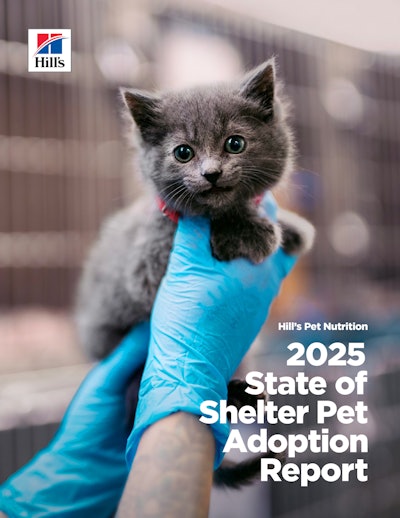
Hill's Pet Nutrition's 2025 State of Shelter Pet Adoption Report reveals that while 63% of Americans would likely choose shelters for their next pet, veterinary costs and financial concerns remain primary obstacles to adoption amid a fifth consecutive year of declining shelter adoptions.
Animal shelters face mounting pressure as overpopulation reaches critical levels, with 103,000 animals added to the total shelter population in 2024 despite an 11% decrease in animals entering facilities since 2019, according to Shelter Animals Count data. Hill's Pet Nutrition's third annual State of Shelter Pet Adoption Report identifies key consumer barriers preventing potential adopters from converting interest into action.
The research surveyed 2,500 current and prospective pet owners across diverse socioeconomic backgrounds, revealing that financial concerns dominate adoption decisions. Veterinary care ranks as the top pet ownership expense concern across all age groups, with 64% of Americans reporting that veterinary costs directly impact their decision to adopt. Additionally, 48% cite overall pet ownership costs and 32% point to initial adoption fees as major barriers.
"Addressing the shelter crisis requires a community-centric approach, and we are dedicated to collaborating with shelters and veterinarians nationwide to find innovative approaches to improving outcomes for shelter pets," said Dr. Chelsie Estey, U.S. chief veterinary officer at Hill's Pet Nutrition. "Our latest State of Shelter Pet Adoption Report uncovers insights which empower us to help overcome existing barriers and find solutions to convert interest into adoptions."
The study reveals generational differences in adoption patterns and concerns. Younger Americans demonstrate higher standards for veterinary care access, showing 12% greater concern than older generations for preventative, sick and urgent visits, plus post-adoption veterinary support. However, Gen Z and Millennials face additional challenges, including higher rates of housing restrictions on pet ownership.
Despite these obstacles, younger generations remain crucial for large dog adoption, with 34% of Gen Z and Millennials likely to adopt large dogs compared to just 18% of Gen X and Baby Boomers. Large dogs currently experience the longest shelter stays, making this demographic particularly important for addressing overpopulation.
Foster program awareness has grown to 55% of Americans, up from 52% in 2024, though actual participation remains low at 11%. Key motivating factors for potential foster families include access to expert guidance (74%), fostering pets with experience around other animals (72%), short-term options (71%), and financial compensation (70%).
"The 2025 State of Shelter Pet Adoption Report provides invaluable, data-driven insights that are crucial for understanding the evolving landscape of pet adoption," said Stephanie Filer, executive director at Shelter Animals Count. "At Shelter Animals Count, data plays a critical role in helping shelters and rescues identify challenges, improve outcomes, and make informed decisions to better support animals in their care. Collaboration rooted in this kind of analysis is key to navigating ongoing pressures facing the sheltering system."
The report also highlights the effectiveness of post-adoption support, with 95% of pet owners who received support when considering surrender ultimately keeping their pets. This data point underscores the importance of ongoing resources in preventing animals from returning to shelters.
Hill's continues supporting shelter animals through its Food, Shelter & Love program, which has provided more than $300 million worth of nutrition to over 1,000 animal shelters since 2002.
















